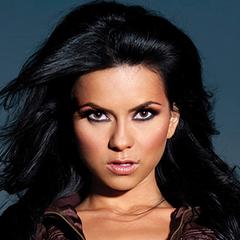歌手:the who
2012-12-15、歌谱控、人气:(载入中...)
- 姓名:the who
- 性别:组合
- 别名:暂无
- 国籍:英国
- 语言:英语;
- 出生地:英国
- 生日:暂无
- 星座:暂无
- 身高:0
- 体重:0
the who简介:成立时间:1964,英国伦敦
解散时间:1983
风格划分:时髦音乐、硬摇滚
The Who是在摇滚乐发展的进程中很有“激情”的一支乐队,四个成员通过不同的行为反映了同样的一种情绪——疯狂:吉他手Pete Townshend用能表演风车技法的灵巧的手砸碎了自己的吉他;鼓手Keith Moon推翻了鼓架;主唱Roger Daltrey则肆无忌惮地在舞台上发威;贝司手John Entwistle向观众投去肆虐的眼神。在这些不平常的举止后面,非凡的音乐也应蕴而生。
The Who在音乐风格上,通过狂暴的吉他和极度活跃的贝司的演奏,加上混乱但强劲的鼓点,在传统的摇滚和R&B的风格基础上不断求新,他们的即兴发挥表演也更加深了他们音乐的魅力。
吉他手Pete Townshend才华横溢,是当时英国出色的歌曲创作者,不但他创作的单曲“The Kids Are Alright”、“My Generation”等等,成了当时年轻人的最爱,而且他独创的摇滚歌剧《Tommy》也受到了主流音乐的批评家们的重视。他将白人音乐、概念音乐有机地注入到了作品当中。
步入70年代后,The Who已经成了一支成功的擅长舞台表演的乐队。1978乐队鼓手Keith Moon不幸去世,乐队随之在1983年解散。但是,在80年代末和90年代的几次国外巡演中,乐队曾经一度重新集合在一起。
Few bands in the history of rock & roll were riddled with as many contradictions as the Who. All four members had wildly different personalities, as their notoriously intense live performances demonstrated. The group was a whirlwind of activity, as the wild Keith Moon fell over his drum kit and Pete Townshend leaped into the air with his guitar, spinning his right hand in exaggerated windmills. Vocalist Roger Daltrey strutted across the stage with a thuggish menace, as bassist John Entwistle stood silent, functioning as the eye of the hurricane. These divergent personalities frequently clashed, but these frictions also resulted in a decade's worth of remarkable music — it took some five years to find their audience, but at the tail end of the 1960s they suddenly achieved a level of popularity rivaling the Rolling Stones, both as a live act and in album sales.
As one of the key figures of the British Invasion and the mod movement of the mid-'60s, the Who were a dynamic and undeniably powerful sonic force. They often sounded like they were exploding conventional rock and R&B structures with Townshend's furious guitar chords, Entwistle's hyperactive basslines, and Moon's vigorous, seemingly chaotic drumming. Unlike most rock bands, the Who based their rhythm on Townshend's guitar, letting Moon and Entwistle improvise wildly over his foundation, while Daltrey belted out his vocals. This was the sound the Who thrived on in concert, but on record they were a different proposition, as Townshend pushed the group toward new sonic territory. He soon became regarded as one of the finest British songwriters of his era, rivaling John Lennon and Paul McCartney of the Beatles and Mick Jagger and Keith Richards of the Rolling Stones, as songs like "The Kids Are Alright" and "My Generation" became teenage anthems, and his rock opera, Tommy, earned him respect from mainstream music critics.
Townshend continually pushed the band toward more ambitious territory, incorporating white noise, pop art, and conceptual extended musical pieces into the group's style. The remainder of the Who, especially Entwistle and Daltrey, weren't always eager to follow him in his musical explorations, especially after the success of his first rock opera, Tommy. Instead, they wanted to stick to their hard rock roots, playing brutally loud, macho music instead of Townshend's textured song suites and vulnerable pop songs. Eventually, this resulted in the group abandoning their adventurous spirit in the mid-'70s, as they settled into their role as arena rockers. The Who continued on this path even after the death of Moon in 1978, and even after they disbanded in the early '80s, as they reunited numerous times in the late '80s and '90s to tour America. The group's relentless pursuit of the dollar was largely due to Entwistle and Daltrey, who never found successful solo careers, but it had the unfortunate side effect of tarnishing their reputation for many longtime fans. However, there's little argument that at their peak the Who were one of the most innovative and powerful bands in rock history.
Townshend and Entwistle met while attending high school in the Shepherd's Bush area of London. In their early teens, they played in a Dixieland band together, with Entwistle playing trumpet and Townshend playing banjo. By the early '60s, the pair had formed a rock & roll band, but Entwistle departed in 1962 to play in the Detours, a hard-edged rock & roll band featuring a sheet-metal worker named Roger Daltrey on lead guitar (and trombone!). By the end of the year, Townshend had joined as a rhythm guitarist, and in 1963 Daltrey gave up his guitar chores — a consequence of his day job as a metal worker — and became the group's lead vocalist after Colin Dawson (followed briefly by another singer named Gabby, who didn't last) left the band. The group's sound evolved rapidly during this period, and was especially influenced not only by American acts such as James Brown, Booker T. & the MG's, and Eddie Cochran — each of whom had songs represented in the group's repertory — but also one classic British act, Johnny Kidd & the Pirates, with whom they shared a bill. Johnny Kidd (real name Frederick Heath) had been together since the late '50s, and rocked the British charts with an original called "Shakin' All Over" (which Townshend and company also added to their set list); they'd built their reputation on their fierce renditions of American-style R&B, which relied heavily on a lean single guitar/bass/drums approach, with the single guitarist — very unusual in England during this period in any recording act — playing both the rhythm and lead parts. Hearing and seeing their presentation up close while playing support to them, Townshend was impressed and realized that he took naturally to that approach, and the Detours were down to a single guitar in short order. A name change also followed, as the group sought to keep its image and profile out in front of the curve of popular culture — with the Beatles burning up the charts, something better and more striking that the Detours was called for, and between Daltrey and Townshend thrashing it out, they settled on the Who, which confused people in conversation at first but worked great (and memorably) on posters. Within a few more months, amid all of these changes, original drummer Doug Sandom — who was considerably older than the others, and married — had parted ways with the Detours, just as they were about to try and make the jump to cutting a record. In his place, the group added Keith Moon, who had previously drummed with a surf rock band called the Beachcombers.
As the group struggled to get a break, Townshend attended art school, while the remaining three worked odd jobs. Soon, the band became regulars at the Marquee Club in London and attracted a small following, which led to the interest of manager Pete Meaden. Under the direction of Meaden, the Who changed their name to the High Numbers and began dressing in sharp suits, all in order to appeal to the style- and R&B-obsessed mods — in the social order of early-'60s English youth, the mods were fiercely independent teenagers, originally of middle-class (by British standards) origins, who began gathering together in working-class clubs, initially around London, in the early '60s; they dressed so









